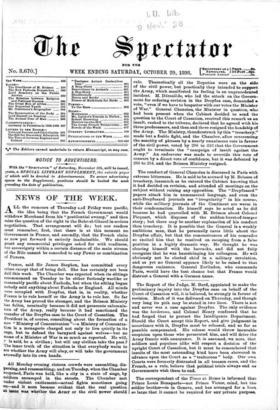The conduct of General Chanoine is discussed in Paris with
extreme bitterness. He is said to be accused by M. Brisson of treachery, inasmuch as he entered the Cabinet knowing that it had decided on revision, and attended all meetings on the subject without raising any opposition. The "Dreyfneard" papers attack him in unmeasured language, and even the anti-Dreyfusard journals see " irregularity " in his course, while the military journals of the Continent are warm in their condemnation. He himself says he acted as he did because he had quarrelled with M. Brisson about Colonel Picquart, which disposes of the sudden-burst-of-temper story ; but there may be another explanation of his conduct than treachery. It is possible that the General is a weakly ambitious man, that he personally cares little about the Dreyfus affair, but that the remonstrances of his comrades so excited him that he resolved on escaping from a false position in a highly dramatic way. He thought he was clearing himself with the barracks, and did not fully recognise that he was hamstringing his colleagues. He will obviously not be elected chief in a military revolution, and as yet no General appears likely to be raised to that dangerous eminence. General Zurlinden, who commands Paris, would have the best chance but that France would distrust a General with a German name.






































